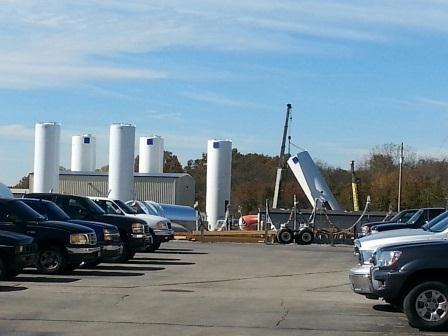How Systems Integrators Ensure Cleaner Power Plants
May 16, 2014

Since the announcement of Mercury and Air Toxics Standards (MATS) in 2011, power producers across the U.S. have been diligently working to reduce flue gas emissions prior to an EPA-mandated deadline of April 2015. The goal behind MATS: to limit mercury, acid gases, and other toxic pollution emissions from power plants.
Activated Carbon Injection (ACI) is the most established system for reducing mercury emissions from coal-fired boiler flue gases. Powdered Activated Carbon (PAC) is injected from a storage silo into the flue gas, where it absorbs mercury and is collected by the plant’s particulate collector. ACI systems are greater than 90% effective. Dry Sorbent Injection (DSI) systems are less expensive than scrubbers, are often used to enhance the effectiveness of a current APC system, and are easy to retrofit. They may be combined with ACI systems to enhance their performance.
The demand for contracted systems integrators specializing in ACI and DSI systems has grown as power producers engage them to upgrade old systems or add them to new power plants. In doing so, systems integrators have taken on the responsibility of guaranteeing flue emissions reductions, which includes the risks associated with meeting contractual deadlines.
Systems integrators are the experts when it comes to installing ACI and DSI systems. However, regardless of expertise, when it comes to meeting deadlines, they find themselves at the mercy of suppliers. Finding suppliers that are responsive to efficient turnaround times and those that offer the capacity to deliver quantity as well as high-quality product when needed is key to ensuring on-time completion, and ultimately, the ability to avoid paying liquidated damages to a power plant for a breached contract. Therefore, it is important to ensure the suppliers they choose have the ability to deliver as required.
“When it comes to working with systems integrators, we know their top concerns are our capacity to deliver high-quality, high-volume production, as well as how capable we are of handling fast turnaround,” said Jay Anzelmo, director of dry bulk sales for CST Storage. “From the perspective of storage tanks, we understand the value of plug and play and we strive to deliver to a product that is as turnkey as possible.”
When selecting suppliers for ACI and DSI systems, some key considerations include: (1) the ability to expedite foundation loads and anchor bolt layouts; (2) drawing and manufacture lead times; and (3) production capacity for multiple tanks. Questions to ask potential suppliers should focus on their experience with quick turn-around approval and expedited plans, as well as whether they have a team on hand ready to meet the challenges of a quick turn.
When it comes to a supplier’s capacity, questions focus on production, and whether a vendor has the ability to manufacture and deliver parts in a short amount of time. Does the manufacturer offer a facility large enough to handle the job? Do they employ qualified crews to produce, finish, and install their component, if necessary?
For systems integrators, 60% to 70% of their ACI and DSI systems focus on the components to be installed inside a storage tank. The storage tank is a cornerstone to the system, and so the tank supplier must also be a quality manufacturer, as well as one that is reliable and able to deliver on time.
Three key advantages include the capability to host a customer’s components and equipment inside a warehouse, rather than outside and subject to weather. The company also receives shipments of components to be installed in the tanks directly from the other suppliers and manages them, inventorying them for the systems integrator.
Finally, the tank manufacturer offers the resources to run or start up equipment at the factory prior to shipment to the field, eliminating the need for field technicians to rework the storage piece prior to start up.
When it comes to choosing a tank manufacturer for an ACI or DSI system, questions to ask might include:
* How many dedicated pads does the manufacturing facility have?
* Does the manufacturer inventory and manage components and equipment sent by suppliers?
* Does the manufacturer offer a staff of qualified professional electricians and plumbers exclusively dedicated to working on CIT tanks?
* Does the manufacturer have the ability to coat tanks with the special coatings required by the systems integrator?
* Would the manufacturer provide case histories of similar projects they’ve completed?
The challenge for power plants is meeting MATS deadlines. The challenge for systems integrators is delivering the high-quality systems on time to help them meet those deadlines. Selecting reliable suppliers is the best way for systems integrators to ensure they deliver what they’ve promised.
For more information, contact Jay Anzelmo, director of dry bulk sales, CST Storage, a div. of CST Industries Inc. (Lenexa, KS) at 913-621-3700 or visit www.cstindustries.com.
For related equipment reviews, articles, and news, visit our Storage Equipment Zone
You May Also Like


